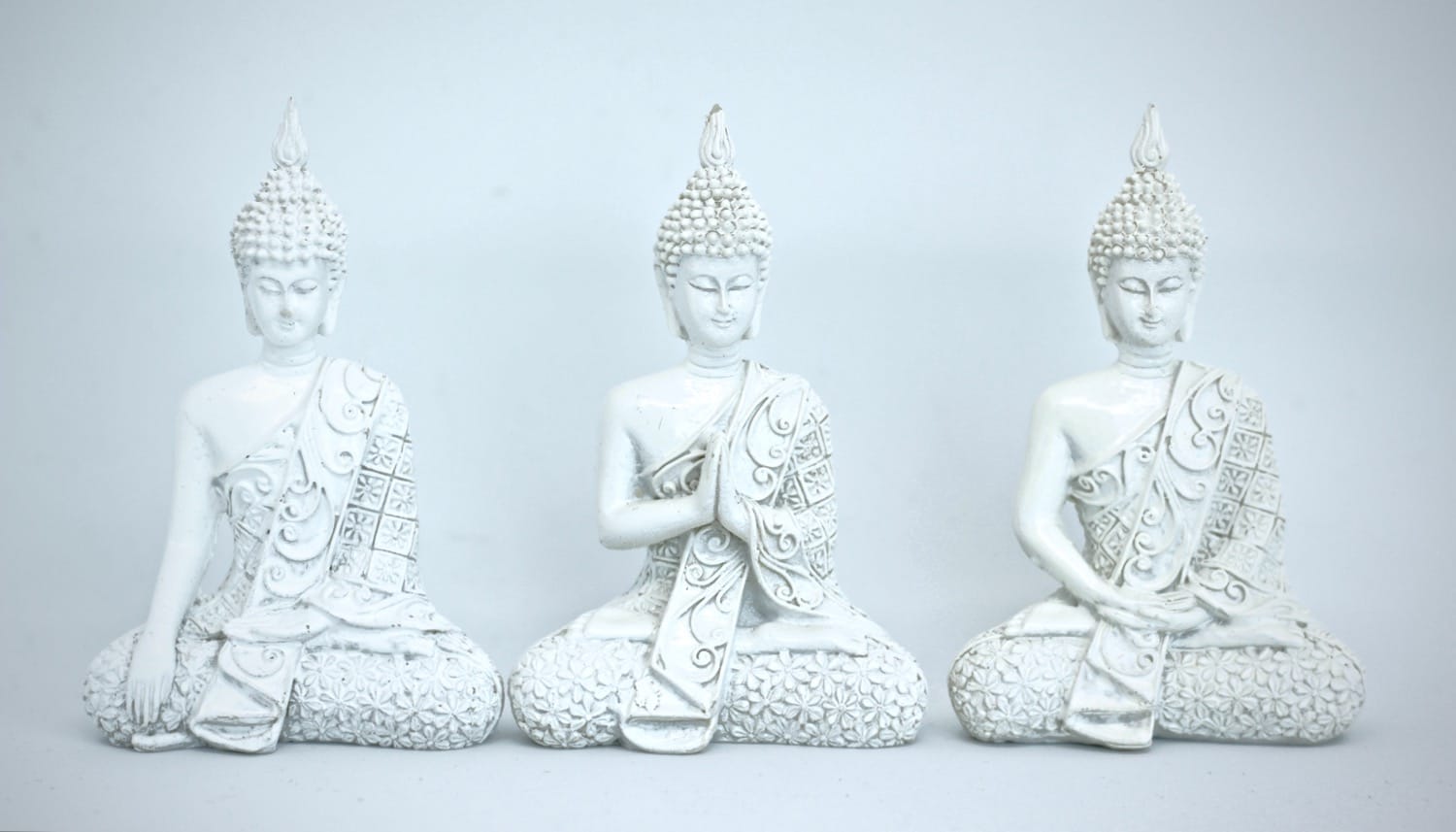When I think of my experience with sexual assault and domestic abuse, I think of the three jewels of Buddhism. Years ago, these jewels were removed from my life at the hands of an abusive partner. As I journeyed through this difficult partnership, I felt the acute absence of the three expressions of awakened mind that Buddhists take refuge in: buddha, dharma, and sangha. Without them, I lost sight of my true self. Within them, I have found a space for healing.
I was a first year in college when I entered my first relationship. Though young, I felt I’d been waiting my whole life to open my heart to another person and experience the joys of love and intimacy. Growing up queer, trans, and “different,” I struggled to navigate my body, its desires, and place in this social and sexual world. When I found someone of interest who also found yearning in me, I felt wholly excited (with a tinge of trepidation). In the beginning, it was exciting. We would stay up late together discussing racial justice, our mutual love of novelist James Baldwin, and the queer canonical series, The L Word. However, the joy soon left, and the relationship quickly devolved.
I started to believe I was worth nothing at all.
For many months, I was forced to perform sexual acts on my partner. There was no intimacy, no connection. I was not a person but an object. When I touched her, I feared that if I made any noise at all, she would shame and attack me. If I spoke against this sexual treatment, she would blame me for not knowing what I really wanted. She eliminated the space for my desires to be heard. Pain and fear rapidly pulsed through my body as her anger and blame awaited—a sense that every action of mine was to be met with castigation and a sense of misstep from her.
I lost connection to my body, my emotions, and myself. She rarely showed me the kindness I now know I deserved. As a result, I started to believe I was worth nothing at all.
One year, we had a particularly difficult night on New Year’s Eve. Everywhere we went, misogyny seemed to rear its ugly head. We saw a woman passed out on the sidewalk, a man she did not know looking around to see if anyone else noticed her. His intentions seemed far from good and so my friends and I stayed with her until she reunited with her husband. Later in the night, we walked a drunk man back to his hotel. He called the women of our group “bitches,” fluctuating between attacking them and flirting with them. Another man was ready to strike his girlfriend until we interjected. We saw even more men sexually harassing women with their words and bodies.
I went home that night terrified and upset. To my surprise, my partner showed me great compassion, and I went to sleep feeling loved. When I awoke, I hoped this softness might remain, but when I shared my distress at the previous night she responded coldly. “Get over it, Ray,” she said. “You had your time last night.”
Fundamentally, I was a buddha, but that awareness was cut off from my experience.
She stopped listening, so I stopped talking.
I cried often — in bathrooms, outside, and in bed as she slept next to me. I learned to hide my tears. If she saw me crying, she was quick to criticize.
“Are you seriously crying again?” she’d ask. Even my tears were not safe from her malice.
One by one, the three jewels fell from the shelf of my life.
The Buddha
In Buddhism, we look to the historical figure Siddhartha Gautama — the awakened one — for refuge. We see the Buddha as ourselves. We see ourselves as beings who inherently contain the same seeds of wisdom, understanding, compassion, and love that the Buddha did.
The Buddha was able to look at his suffering and see clearly into his emotions, his human experience, and the needs of his community.
While in an abusive relationship, my sense of clear-seeing was compromised. I couldn’t open to my suffering. I wasn’t allowed to express my pain. I lost all compassion for myself.
Fundamentally, I was a buddha — a living being navigating a suffering world — but that awareness was cut off from my experience.
The Dharma
The dharma refers to the teachings of the historical Buddha, which have been explored and built upon by many generations of teachers and practitioners. The dharma is like a well of knowledge, supporting us to lead a fruitful life.
In my abusive relationship, I could not absorb the wisdom of these teachings. I had the skills to meditate, but not the ability. I was too frightened to experience the roaring anxiety and truthful realizations that came to light in meditation. I couldn’t bring myself to practice. After all, if I were to practice I might hear those voices that tell me I’m too young, too naïve, too insecure, too indecisive. Such scarring criticisms were too much to feel, and too painful to contemplate. Even the powerful words of Thich Nhat Hanh, which I was reading at the time, could not find their way to my heart.
The dharma is radical and transformative when we open ourselves to it. In the midst of my abuse, I felt unsafe to do so.
The Sangha
My experience of abuse obliterated my personal sangha, my sacred community of friends. Early on in my relationship, I confided in a friend about the issues I was having with my girlfriend, asking for guidance. I returned to my girlfriend to talk about this and she responded by shaming me for having shared my grievances with anyone else.
From that point forward, she hated that friend. She became angry whenever I saw them, and soon, I stopped seeing my friend altogether.
This repeated itself with many other friends. I was afraid they’d see the abuse I could not yet admit to myself. Though I longed for community, I wouldn’t dare cross my girlfriend to have it, or allow her abuse to be revealed to those I loved.
The loss of sangha kept me from being honest about my pain. It kept me from finding refuge in the hearts of the people I loved and trusted.
The three jewels have helped me work with my fractured heart more intimately, supporting me with a softness that shows me healing is possible.
I’ve struggled for years to discuss this relationship, and to be honest with myself about the traumatic effects of it. I told myself the abuse I experienced wasn’t a big deal compared to those of my friends, who had suffered what I saw as worse offenses.
It took me years to realize my partner had been sexually and emotionally abusive toward me. Even today, I struggle to call it by its name.
When the relationship ended, the three jewels returned to my life, carrying healing with them. I took refuge in the buddha, the dharma, and the sangha. Each of these jewels has awakened a deeper understanding of my experience of abuse.
Taking refuge in each precious jewel, I find I am able to practice compassion for my hurting heart. I see the buddha in me with clarity, even in moments where fear and anger still surge through my body. I know that I too can follow the path to enlightenment. I can once again absorb the words and teachings of the historical Buddha and the realized beings that have carried on his legacy. I can allow their wisdom to touch my heart. I’m able to lean on my sangha, my dear friends, when I am most hurting and hopeless.
My Buddhist practice has helped me understand my experiences of abuse with greater clarity. The many other trans and genderqueer people, as well as cisgender women and men that have come forward in recent times with their own stories of abuse have also helped me recognize and comprehend my own.
The three jewels have not entirely cured my pain or negated the trauma I experienced, but they allow me to hold these difficult realities with kindness, understanding, and non-judgment. They have helped me work with my fractured heart more intimately, supporting me with a softness that shows me healing is possible. Each time I sit with my experiences of abuse I remember the simple teaching of Thich Nhat Hanh: from the mud comes the lotus. Likewise, drawn from the three jewels comes liberation, comes love, comes compassion, comes awareness — comes my fortitude to keep my heart tender, open, gentle, blooming, and alive.

